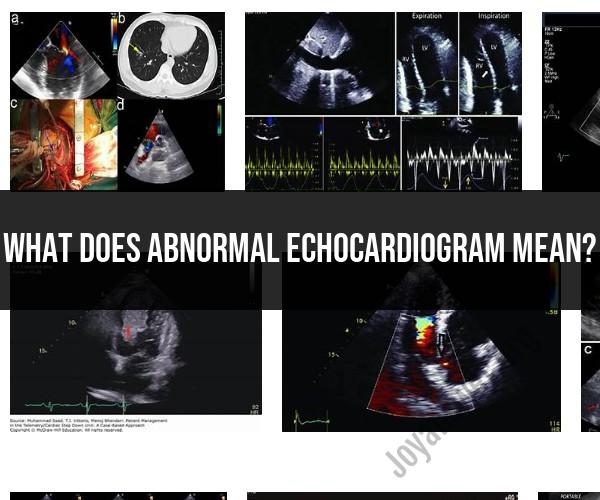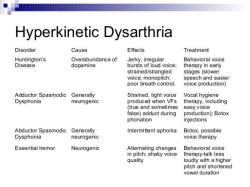What does abnormal echocardiogram mean?
An abnormal echocardiogram, often referred to as an "abnormal echo" or "abnormal echocardiogram results," indicates that the ultrasound imaging of the heart (echocardiogram or echo) has revealed structural or functional abnormalities in the heart. This diagnostic test is performed to assess the heart's size, shape, and how well it is functioning. Abnormal echocardiogram results can suggest various cardiac conditions or issues, including:
Valvular Heart Disease: Abnormalities in the heart valves, such as stenosis (narrowing) or regurgitation (leaking), can be detected through an echocardiogram. These conditions can affect the flow of blood through the heart.
Cardiomyopathies: Conditions that affect the heart muscle, like hypertrophic cardiomyopathy or dilated cardiomyopathy, can lead to abnormal echo results. These conditions can cause the heart to pump less effectively.
Congenital Heart Defects: Structural abnormalities present at birth, such as holes in the heart (septal defects), can be identified with echocardiography.
Pericardial Disease: Conditions affecting the pericardium, the sac around the heart, can result in abnormal echocardiogram findings.
Cardiac Tumors: Rarely, tumors or growths within the heart can be detected through echocardiography.
Aortic Aneurysms or Dissections: Abnormalities in the aorta, the large blood vessel that carries blood away from the heart, can be visualized through an echocardiogram.
Heart Function: The echocardiogram also assesses how well the heart is pumping blood, which can indicate heart failure or other functional issues.
It's important to note that an abnormal echocardiogram does not provide a definitive diagnosis on its own. Instead, it signals the need for further evaluation, additional tests, and clinical assessment by a healthcare provider, such as a cardiologist. The provider will consider the patient's medical history, symptoms, and the echocardiogram findings to determine the underlying cause and develop an appropriate treatment plan.
In summary, an abnormal echocardiogram means that there are deviations from the normal structure or function of the heart, and it serves as a valuable diagnostic tool in identifying a wide range of cardiac conditions. The specific diagnosis and treatment will depend on the underlying cause of the abnormalities observed in the echocardiogram.
Deciphering an Abnormal Echocardiogram: What It May Indicate
An echocardiogram is a non-invasive imaging test that uses sound waves to create a picture of the heart. It can be used to assess the heart's size, shape, function, and blood flow. An abnormal echocardiogram may indicate a variety of heart conditions, including:
- Heart valve disease: This can include stenosis (narrowing) or regurgitation (leaking) of the heart valves.
- Heart muscle disease (cardiomyopathy): This can include hypertrophic cardiomyopathy (thickened heart muscle), dilated cardiomyopathy (enlarged heart muscle), or restrictive cardiomyopathy (stiffened heart muscle).
- Pericardial effusion: This is a buildup of fluid around the heart.
- Congenital heart defects: These are birth defects that affect the structure of the heart.
- Other heart conditions: These can include coronary artery disease, heart failure, and arrhythmias.
Understanding Echocardiogram Results: The Meaning of Abnormal
An abnormal echocardiogram does not necessarily mean that you have a serious heart condition. However, it is important to follow up with your doctor to discuss your results and to get further testing if necessary.
Some common findings on an abnormal echocardiogram include:
- Enlarged heart chambers: This can be a sign of heart failure or cardiomyopathy.
- Reduced ejection fraction: This is a measure of how much blood the heart pumps out with each beat. A reduced ejection fraction can be a sign of heart failure.
- Thickened heart muscle: This can be a sign of hypertrophic cardiomyopathy.
- Leaking heart valves: This can be a sign of heart valve disease.
- Blood clots in the heart: This can be a sign of deep vein thrombosis or atrial fibrillation.
Interpreting Echocardiogram Findings: When Results Are Abnormal
If your echocardiogram is abnormal, your doctor will interpret the findings based on your individual medical history and other test results. They will also consider the severity of the abnormalities and whether they are causing any symptoms.
In some cases, an abnormal echocardiogram may not require any treatment. However, in other cases, treatment may be necessary to manage the underlying heart condition and prevent complications. Treatment options may include medication, surgery, or other procedures.
If you have any questions or concerns about your echocardiogram results, be sure to talk to your doctor.













